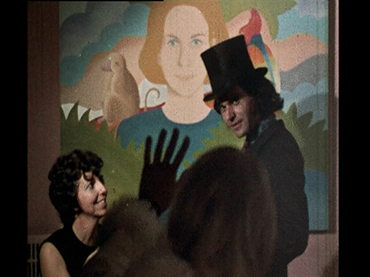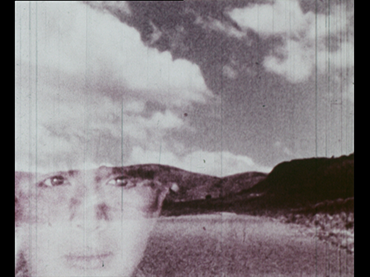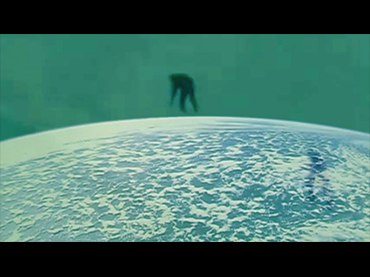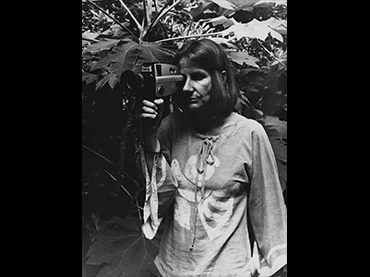-
Friday, 11 December 2020 – 7pm/ Sabatini Building, Auditorium
Session 1. First session. Filming Performance
Narcisa Hirsch
Marabunta (Swarm)
Filming and editing by Raymundo Gleyzer. Lead roles: Narcisa Hirsch, Marie Louise Alemann and Walther Mejía
Argentina, 1967, b/w, sound, 16 mm transferred to digital, 7’55’’Muñecos (Dolls)/Have a Baby
Argentina, USA and UK, 1972, colour, silent, Super-8 transferred to digital, 15’31’’Manzanas (Apples)
Argentina, 1973, colour, original version in Spanish, 16 mm transferred to digital, 4’La noche bengalí (The Bengali Night), co-directed with Werner Nekes
Argentina, 1980, colour, silent, 16 mm transferred to digital, 6’30’’Testamento y vida interior (Testament and Inner Life)
Argentina, 1976, colour, sound, video transferred to digital, 10’38’’Retrato de una artista como ser humano (Portrait of a Woman Artist as a Human Being)
Argentina, 1973, colour, sound, video transferred to digital, 15’51’’Narcisa Hirsch’s first incursions into film were to record her performances and happenings in public spaces. Collective actions, first shot in Super-8 and 16 mm, and later in video, in which Hirsch and the group of artists she worked with sought a different, more direct relationship with a spectator found randomly. These early works also reveal themes the artist would develop across her film work: the mystery of birth and death and our relationship to nature.

-
Saturday, 12 December 2020 – 5pm / Sabatini Building, Auditorium
Session 2. Landscape and Experience
Narcisa Hirsch
Rumi
Argentina, 1995–1999, colour, sound, 16 mm transferred to digital, 27’A-Dios
Argentina, 1989, colour, sound, Super-8 transferred to digital, 22’Patagonia 2
Argentina, 1976, colour, sound, Super-8 transferred to digital, 9’56’’Patagonia takes centre stage and is at the heart of Narcisa Hirsch’s film work as a space of natural encounter, of union between body and the eternal, of dialogue between elements that are at once intimate and immense. This second session in the series includes some of the films in which the film-maker explores Patagonian landscapes and develops her relationship with them.

-
Sunday, 13 December 2020 – 12:30pm / Sabatini Building, Auditorium
Session 3. Experiments with Experimentation
Narcisa Hirsch
Taller (Workshop)
Argentina, 1971, colour, original version in Spanish, 16 mm transferred to digital, 10’Come out
Argentina, 1971, colour, sound, 16 mm transferred to digital, 11’Ama-zona
Argentina, 1983, colour, sound, Super-8 transferred to digital, 10’38’’Canciones napolitanas (Neapolitan Songs)
Argentina, 1971, colour, sound, 16 mm transferred to digital, 10’Aleph
Argentina, 2005, colour, original version in Spanish, Betacam SP transferred to digital, 1’Myst
Argentina, 2019, colour, original version in Spanish and English, video transferred to digital, 15’This third session more clearly expounds the relation Narcisa Hirsch’s work bears to many of the ideas and currents in experimental film: from structural cinema to more sensorial and poetic film-making via abstraction. In these works, we witness Hirsch explore different paths in the experimental genre, making them hers and bringing them closer to her idiosyncratic themes: the feminine body, Argentinian tradition, landscape and nature.


Held on 11 Dec 2020
Narcisa Hirsch is one of the foremost figures in the history of Latin American and international experimental film. Born in Germany in 1928, and living in Argentina since her childhood, her name has lurked in the shadows unduly, owing to a twofold “eccentricity”: being a woman and making films that lie outside central spaces constructing the history of this filmic modality: the United States and Europe.
Yet this binary, off-centre state has not stopped her from being mindful of world movements in experimental film and video art. Her own work, at once domestic and mystical, is related to canonical films and figures from video and experimental art as it constantly shuns imitation and vindicates film as a space of freedom. In Hirsch’s own words: “The freedom of working to a really tight budget is the freedom of not having to sell; the freedom of working in a way that is DIY and artisan, without big teams or stages. I don’t rush either. One frame per day, or one per year. Everyone chooses their time and space, and it’s because of that and everything else that experimental film is a subversive art, more than documentary or political film. More subversive than intellectual or conceptual film. That’s why few go and fewer still remain”.
Hirsch’s first foray into art was as a painter and draughtswoman in the 1960s, before suddenly leaping into public space, staging happenings in the search for a new kind of spectator. Understanding film and creation as a collective process of work and thought, she has built, since the start of her career, a sturdy community around her filmic and artistic practice, a wide-ranging network of experimental artists and film-makers who came together through the Union of Small-Gauge Film-makers (UNCIPAR), around the Goethe Institute and Di Tella Institute, originally comprising figures such as Marie Louise Alemann, Claudio Caldini, Jorge Honik, Juan José Mugni, Horacio Vallereggio and Juan Villola, who are all, ultimately, key to the formation of Argentina’s independent and experimental scene. A network and solid conception of collectiveness that remains today, and, even at the age of ninety-two, Hirsch holds weekly encounters (in-person before the pandemic, now online) with an extensive network of young film-makers and aficionados of experimental cinema that embrace her work.
This retrospective is made up of three sessions reflecting some of the must-see pictures in her film oeuvre, made from the 1960s onwards. These works, chosen to engage in dialogue with the film-maker, illuminate spiritual and existential themes: love, birth, death, eroticism and feminine power, orbiting around the materiality of the body. In Narcisa Hirsch’s work domestic scenes and landscapes of inner-city and outlying areas of Buenos Aires and Patagonia function as an amplification of an exploration that is both formal and personal: the body, the eternal, the inside, the outside, movement, that which remains, intimacy and collectivity.
This programme is framed inside a joint project between Museo Reina Sofía and Documenta Madrid, an international film festival promoted by Madrid’s City Council and returning this year, in 2020, in a hybrid format combining in-person and online formats.
Curators
Cecilia Barrionuevo, in collaboration with Narcisa Hirsch
Acknowledgements
Daniela Muttis and Tomás Rautenstrauch (the Narcisa Hirsch Cinematheque)
Organised by
Museo Reina Sofía and Documenta Madrid (17th International Film Festival)


Admission: Free, until full capacity is reached, with prior ticket collection on the Museo Reina Sofía website from 10am on the last working day before the activity. A maximum of 1 per person. Doors open 30 minutes before screenings
Más actividades

Institutional Decentralisation
Thursday, 21 May 2026 – 5:30pm
This series is organised by equipoMotor, a group of teenagers, young people and older people who have participated in the Museo Reina Sofía’s previous community education projects, and is structured around four themed blocks that pivot on the monstrous.
This fourth and final session centres on films that take the museum away from its axis and make it gaze from the edges. Pieces that work with that which is normally left out: peripheral territories, unpolished aesthetics, clumsy gestures full of intent. Instead of possessing an institutional lustre, here they are rough, precarious and strange in appearance, legitimate forms of making and showing culture. The idea is to think about what happens when central authority is displaced, when the ugly and the uncomfortable are not hidden, when they are recognised as part of the commons. Film that does not seek to be to one’s liking, but to open space and allow other ways of seeing and inhabiting the museum to enter stage.
![Tracey Rose, The Black Sun Black Star and Moon [La luna estrella negro y negro sol], 2014.](https://recursos.museoreinasofia.es/styles/small_landscape/public/Obra/AD07091_2.jpg.webp)
On Black Study: Towards a Black Poethics of Contamination
Monday 27, Tuesday 28 and Wednesday 29 of April, 2026 – 16:00 h
The seminar On Black Study: Towards a Black Poethics of Contamination proposes Black Study as a critical and methodological practice that has emerged in and against racial capitalism, colonial modernity and institutional capture. Framed through what the invited researcher and practitioner Ishy Pryce-Parchment terms a Black poethics of contamination, the seminar considers what it might mean to think Blackness (and therefore Black Study) as contagious, diffuse and spreadable matter. To do so, it enacts a constellation of diasporic methodologies and black aesthetic practices that harbor “contamination” -ideas that travel through texts, geographies, bodies and histories- as a method and as a condition.
If Blackness enters Western modernity from the position of the Middle Passage and its afterlives, it also names a condition from which alternative modes of being, knowing and relating are continually forged. From within this errant boundarylessness, Black creative-intellectual practice unfolds as what might be called a history of touches: transmissions, residues and socialities that unsettle the fantasy of pure or self-contained knowledge.
Situated within Black radical aesthetics, Black feminist theory and diasporic poetics, the seminar traces a genealogy of Black Study not as an object of analysis but as methodological propositions that continue to shape contemporary aesthetic and political life. Against mastery as the horizon of study, the group shifts attention from what we know to how we know. It foregrounds creative Black methodological practices—fahima ife’s anindex (via Fred Moten), Katherine McKittrick’s expansive use of the footnote, citation as relational and loving labour, the aesthetics of Black miscellanea, and Christina Sharpe’s practices of annotation—as procedures that disorganise dominant regimes of knowledge. In this sense, Black Study is approached not as a discrete academic field but as a feel for knowing and knowledge: a constellation of insurgent practices—reading, gathering, listening, annotating, refusing, world-making—that operate both within and beyond the university.
The study sessions propose to experiment with form in order to embrace how ‘black people have always used interdisciplinary methodologies to explain, explore, and story the world.’ Through engagements with thinkers and practitioners such as Katherine McKittrick, C.L.R. James, Sylvia Wynter, Christina Sharpe, Fred Moten, Tina Campt, Hilton Als, John Akomfrah, fahima ife and Dionne Brand, we ask: What might it mean to study together, incompletely and without recourse to individuation? How might aesthetic practice function as a poethical intervention in the ongoing work of what Sylvia Wynter calls the practice of doing humanness?

Intergenerationality
Thursday, 9 April 2026 – 5:30pm
This series is organised by equipoMotor, a group of teenagers, young people and older people who have participated in the Museo Reina Sofía’s previous community education projects, and is structured around four themed blocks that pivot on the monstrous.
The third session gazes at film as a place from which to dismantle the idea of one sole history and one sole time. From a decolonial and queer perspective, it explores films which break the straight line of past-present-future, which mix memories, slow progress and leave space for rhythms which customarily make no room for official accounts. Here the images open cracks through which bodies, voices and affects appear, disrupting archive and questioning who narrates, and from where and for whom. The proposal is at once simple and ambitious: use film to imagine other modes of remembering, belonging and projecting futures we have not yet been able to live.

Remedios Zafra
Thursday March 19, 2026 - 19:00 h
The José Luis Brea Chair, dedicated to reflecting on the image and the epistemology of visuality in contemporary culture, opens its program with an inaugural lecture by essayist and thinker Remedios Zafra.
“That the contemporary antifeminist upsurge is constructed as an anti-intellectual drive is no coincidence; the two feed into one another. To advance a reactionary discourse that defends inequality, it is necessary to challenge gender studies and gender-equality policies, but also to devalue the very foundations of knowledge in which these have been most intensely developed over recent decades—while also undermining their institutional support: universities, art and research centers, and academic culture.
Feminism has been deeply linked to the affirmation of the most committed humanist thought. Periods of enlightenment and moments of transition toward more just social forms—sustained by education—have been when feminist demands have emerged most strongly. Awareness and achievements in equality increase when education plays a leading social role; thus, devaluing intellectual work also contributes to harming feminism, and vice versa, insofar as the bond between knowledge and feminism is not only conceptual and historical, but also intimate and political.
Today, antifeminism is used globally as the symbolic adhesive of far-right movements, in parallel with the devaluation of forms of knowledge emerging from the university and from science—mistreated by hoaxes and disinformation on social networks and through the spectacularization of life mediated by screens. These are consequences bound up with the primacy of a scopic value that for some time has been denigrating thought and positioning what is most seen as what is most valuable within the normalized mediation of technology. This inertia coexists with techno-libertarian proclamations that reactivate a patriarchy that uses the resentment of many men as a seductive and cohesive force to preserve and inflame privileges in the new world as techno-scenario.
This lecture will address this epochal context, delving into the synchronicity of these upsurges through an additional parallel between forms of patriarchal domination and techno-labor domination. A parallel in which feminism and intellectual work are both being harmed, while also sending signals that in both lie emancipatory responses to today’s reactionary turns and the neutralization of critique. This consonance would also speak to how the perverse patriarchal basis that turns women into sustainers of their own subordination finds its equivalent in the encouraged self-exploitation of cultural workers; in the legitimation of affective capital and symbolic capital as sufficient forms of payment; in the blurring of boundaries between life and work and in domestic isolation; or in the pressure to please and comply as an extended patriarchal form—today linked to the feigned enthusiasm of precarious workers, but also to technological adulation. In response to possible resistance and intellectual action, patriarchy has associated feminists with a future foretold as unhappy for them, equating “thought and consciousness” with unhappiness—where these have in fact been (and continue to be) levers of autonomy and emancipation.”
— Remedios Zafra

27th Contemporary Art Conservation Conference
Wednesday, 4, and Thursday, 5 March 2026
The 27th Contemporary Art Conservation Conference, organised by the Museo Reina Sofía’s Department of Conservation and Restoration, with the sponsorship of the Mapfre Foundation, is held on 4 and 5 March 2026. This international encounter sets out to share and debate experience and research, open new channels of study and reflect on conservation and the professional practice of restorers.
This edition will be held with in-person and online attendance formats, occurring simultaneously, via twenty-minute interventions followed by a five-minute Q&A.